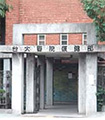Office phone No.: +886-2-2312-3456 ext. 267651
Fax No.: +886-2-2382-5734
Email: a030877@ntuh.gov.tw
- Ultrasonography-guided injection for pain management
- Development of rehabilitation robots to assist patients with functional impairment
- Complete digitization of rehabilitation treatment records
- Outstanding team in Taipei for early intervention
- Interdisciplinary collaboration to maximize rehabilitation potential of patients
About Us
The services provided by the Department of Physical Medicine and Rehabilitation (PM&R) include: neurological rehabilitation (neurorehabilitation); musculoskeletal and joint rehabilitation; pediatric rehabilitation; speech and language rehabilitation; cardiac rehabilitation, pulmonary rehabilitation, as well as the evaluation and installation of prosthetics and other assistive devices.
Medical care and services
Neurorehabilitation
At the Department of PM&R, we treat those with neuromuscular disorders through inpatient or outpatient neurorehabilitation. Common disorders are as follows:
- Central nervous system (CNS) diseases and sequelae such as strokes, brain injuries, brain degenerative diseases, encephalitis, and tumors
- Spinal cord diseases such as motor neuron disease, myelitis, spinal cord injury, and compressive lesions
- Peripheral neurological diseases and sequelae such as facial palsy, diabetic neuropathy, polyneuritis, hereditary peripheral neuropathy, entrapment neuropathies (e.g., carpal tunnel syndrome), radiculopathy (nerve root lesions), sciatica, and nerve injuries
- Muscular diseases such as myasthenia gravis, muscular dystrophy, myotonia, and polymyositis
- Acute or chronic pain such as neuralgia, fasciitis, and paraesthesia
- Other disorders related to neurological diseases such as intervertebral disc protrusion, spondylosis (spinal osteoarthritis), and neuroforamen stenosis
Patients with neurological diseases can schedule an appointment for inpatient/outpatient rehabilitation treatment as prescribed by a physiatrist. The Department of PM&R also has a neurophysiological examination room, which performs electromyography (EMG) tests and nerve conduction studies (NCS).
Musculoskeletal Rehabilitation
We provide rehabilitation services for patients with various musculoskeletal disorders, injuries, or diseases including:
- Acute pain as often caused by acute muscle strain, joint sprains, contusions, inflammatory diseases and infections
- Chronic pain as often caused by repeated ligament or tendon strains, cancer pain, pelvic pain, autonomic nervous system disorders, degenerative arthritis, migraines, chronic lower back pain, myofascial pain syndrome (MPS), and fibromyalgia syndrome
- Complete with a musculoskeletal ultrasound examination room, which can examine and treat disorders of the joints, ligaments and muscles
Pediatric Rehabilitation
Pediatric rehabilitation mainly seeks to treat mental or motor development delays in young children caused by congenital or acquired nervous system abnormalities. This department’s objective is to strengthen the independence of these young children with developmental delays through rehabilitation training. Our services include:
- Early treatment of children aged 0-6 years with delayed development through professional rehabilitation assessment and treatment
- Botox injections to mainly treat dysfunction caused by spasticity. These injections are often used for movement disorders in children with cerebral palsy.
- Treatment of children with disorders outside of developmental delays, such as torticollis (wry neck) or dysarthria (a speech disorder caused by muscle weakness)
- Continuing education courses for healthcare professionals (HCPs), with improving professional standards as the goal of instruction
Cardiac Rehabilitation
Cardiac rehabilitation is the rehabilitation of patients with cardiopulmonary diseases under the supervision of physiatrists to restore overall physical and mental health as quickly as possible. The objective is to prevent the onset of another heart attack, and the progression of existing heart disease(s). Our cardiac rehabilitation program provides the following services:
- Counseling services for patients to understand and come to terms with the progression of their illnesses, to provide information on activity limitations, and to offer psychological support
- Appropriate exercise training
- Assisting patients in changing their existing risk factors for heart disease such as high blood pressure, smoking, high blood lipids, lack of exercise, obesity, and diabetes
- Workplace injury/illness rehabilitation to help patients return to work
- A variety of cardiac rehabilitation treatments, including rehabilitation after a heart transplant. The department is also equipped with a cardiopulmonary exercise testing (CPET) laboratory.
Pulmonary Rehabilitation
- Pulmonary rehabilitation is targeted mainly at patients with chronic obstructions. Patients with chronic obstructive pulmonary disease (COPD) have an obstruction of the airway such that the flow of gas during breathing is reduced, especially when exhaling.
- Pulmonary rehabilitation includes services such as health education, physical therapy, occupational therapy, nutritional counseling, psychological rehabilitation, and respiratory therapy.
Speech/Language/Swallowing Therapy
Our speech, language, swallowing, and voice rehabilitation program mainly treats the following disorders:
- Adults with language impairments such as aphasia, cognitive communication disorder (due to dementia, right hemisphere damage, etc.)
- Children with language impairments, such as a language delay or aphasia due to acquired brain damage
- Adult speech impairments such as dysarthria, apraxia of speech, stuttering and alaryngeal speech (i.e. for those who have undergone a laryngectomy)
- Children with speech impairments, such as speech sound disorders, dysarthria (due to cerebral palsy), or developmental stuttering
- Swallowing disorders, such as oropharyngeal swallowing disorders in adults or children
- Voice disorders, such as vocal abuse or misuse, or dysphonia due to functional impairments
- Patients with language, speech, swallowing, and voice impairments can schedule an appointment for inpatient/outpatient rehabilitation treatment as prescribed by a physiatrist.
Prosthetics and Assistive Devices
The Department of PM&R has a center for prosthetics and assistive devices, which provides the evaluation and installation of prosthetics and assistive devices, as well as the training on using these mobility aids.